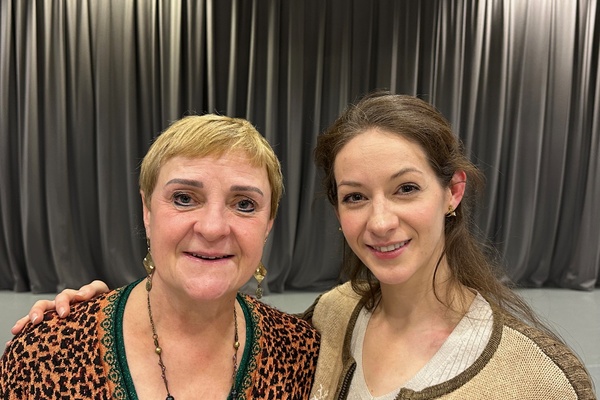Laurretta Summerscales In Conversation with Deborah Weiss
11th December 2023
The Chair of the London Ballet Circle, Susan Dalgetty Ezra, welcomed Laurretta Summerscales to the evening’s conversation. Born in Surrey, Laurretta’s introduction to dance was at her mother’s school, Summerscales Performing Arts. She went on to study at the English National Ballet School before joining the company, where she rose to the rank of Principal at the age of twenty-five. After many years dancing with the company, and wishing to expand her experience, she arranged in 2017 to take a sabbatical year and moved to the Bavarian State Ballet, which she subsequently joined full-time in the following year. Susan also welcomed dance writer Deborah Weiss who would lead the evening’s conversation.
Deborah started the conversation by saying that she had known Laurretta for quite a while. At just twenty-two, she had played Odette/Odile in the English National Ballet’s production of Swan Lake at the Albert Hall. What had that experience been like? Laurretta replied that it was a favourite role and everything she had ever dreamed of! In fact she had wondered whether the experience had been too much for her. She had adequate rehearsal including a month with Derek Deane, always a stickler for detail, and knew that she had been well prepared and that she must believe in herself. She felt confident that her body could do it; the problem lay more within her head!
Was performing ‘in the round’ significantly different from working in the confines of the proscenium stage? In the enormous space which is the Albert Hall? Laurretta admitted that as a relative newcomer it had not unduly worried her that she was being watched from all angles, especially from above, with some audience members high above her in the hall’s gallery. However, it had made her realise how much the whole of your body defines a role, and not just your feet.
Laurretta explained that her immediate family were not natural ‘applauders’ after a performance. The applause coming from all around her in the hall therefore came as something of a shock. However, she found that it was actually a terrific support; she felt there was so much love both in the company and the audience that it felt like a giant hug!
She was then asked about her early years in the profession. In 2007 she had commenced training at the English National Ballet School but after only 18 months Wayne Eagling, then Artistic Director of English National Ballet, had offered her a contract. It had been quite tough joining the company. At the school she had been something of a big fish in a small sea; company life was different.
Just five months after joining the company she danced her first principal role, Myrtha in Mary Skeaping’s Giselle. She had been to rehearsals for the part and knew it well. However, towards the end of the rehearsals a dancer suffered an injury and as a consequence Laurretta was told that she was to dance the role just two days prior to the performance. Deborah questioned her about the stamina required to undertake such a role after just a couple of days rehearsal. She responded that knew she had to push her body to increase her stamina, and it hadn’t let her down.
Deborah noted that Laurretta’s rise to fame had been ‘meteoric’ – and accompanied by a great deal of hard work! She had gone on to dance many major roles with English National Ballet and was made a Principal on her twenty-fifth birthday, when Tamara Rojo was appointed Artistic Director.
In 2017, after many happy years dancing with English National Ballet, Laurretta decided she wanted to expand her repertoire. There were still ballets which she very much wanted to perform – for instance, Don Quixote and La Bayadére – and she had discovered that both would be given in Munich in the coming season. Accordingly she decided to take a year’s sabbatical and auditioned to be a Principal with the Bavarian State Ballet in Munich, an experience which resulted in both Laurretta (and her dancer husband, Yonah Acosta) joining the company full-time a year later.
She had not wanted to leave English National Ballet; she had not wanted to go abroad, away from her family. Indeed, she had not wanted to leave England, describing herself as a very ‘British’ girl, closely connected with her family and her roots. She had certainly never envisaged living abroad. Nevertheless, the possibility of increasing her knowledge and experience of dance was overwhelming, making her realise how much her career meant to her. It was a big step to take – but thankfully it seems to have worked.
Laurretta was asked whether ballet in Munich was very different from her experience in London. She commended her coach, Judith Turos, who had been very supportive and was a fantastic source of information. Again she referred to her national identity; she had not really considered the situation before and had assumed that ballet companies all over the world operated in the same way. But she had found quite significant differences between the English and the Bavarian ballet companies. For instance, Sundays, their only day off, were extremely different. In England they would do something fun like going to a centre to do some shopping. In Munich, Sunday remains a rest day connected to their religion and only restaurants are open. It was hard to adjust in the beginning but after a while she realised that it was good for the body to really rest.
It was in Munich that she and her husband decided to start a family. Laurretta clearly delights in her daughter Analeia, who is nearly two, and Deborah asked how motherhood had changed her. Were her priorities now different? How did she balance being a dancer with being a parent?
As far as the practical details were concerned, Laurretta paid great tribute to her husband in sharing the load. And she was fortunate in the presence of a kindergarten immediately adjacent to the studio building in which they normally worked. She could take her daughter there in the morning, spend most of the day in the studio, and then collect her mid-afternoon. She also said how wonderful it was to be able to call on her own parents when the need arose. As both she and her husband were usually involved in the same shows they might have to fly back to England to leave Analeia with them for a short time.
As for dancing, Laurretta said that she believed having a baby had given her a more emotional approach to roles. She felt more complete as a woman rather than simply a dancing ‘person’. A recent role depicted an older woman and she found that life experience enabled her to approach the performance in a new, more understanding, way.
Laurretta knew that following the birth of her daughter she had to come back and prove herself once again; she had to demonstrate that she remained reliable. The attitude of Igor Zelensky, her Artistic Director in Munich, was simply that every dancer should be encouraged to evolve into whoever they could be naturally, and she found this attitude helped her.
She was asked how Igor, known for working his dancers hard, had reacted when told that she was pregnant. There were other pregnancies in the company at the same time and Laurretta had been scared to tell him; she had thought ‘he will hate me for it’. Not so – Igor had been the nicest he had ever been towards her and had completely supported her. She then knew that all would be well.
After the birth her strength had returned very quickly, enabling her to move and jump with ease. Like most ballerinas, however, she had been concerned about her weight; the purity of line of the body being so important to the image of the dancer. She had found it difficult – almost impossible – to lose the extra pound or two acquired during pregnancy and after some nine months of stress decided to accept the situation.
Just before Christmas Laurretta will be appearing as a guest artist with English National Ballet, as the Sugar Plum Fairy in The Nutcracker. Another milestone in your great career, said Deborah, returning as a guest with the company in which she had commenced her professional life. Returning to the company which had given her so much to encourage her career progression was really special and Laurretta hoped that, in turn, she would be able to inspire other dancers. Dancing for the first time with Lorenzo Trossello, who she had never before met, Laurretta emphasised the need for a quiet one to one meeting with a new partner; it was important to get to know one another before the hurly-burly of rehearsals.
Performing again with her old company was, she said, extremely rewarding and great fun. Before that first show, however, she had to return to Baden-Baden for a performance of Christopher Wheeldon’s Cinderella, and consequently would be spending a considerable amount of time in the air in the next few weeks!
She was then asked about the new season in Munich. Onegin in January, said Laurretta, and probably La Bayadére in April. The company also organised a ‘ballet week’ around Easter time, in which several different ballets would be mounted in the week. She considered the Munich programme, in which shows were interspersed one with another, helped individual dancers to keep on their toes and not become stale.
In questions from the audience Laurretta was asked about the importance of music. This, she replied, is why I dance. The music is everything. She said that some differences between the English and German ways of working might be due to the lingering influence of Russian dance on the Munich school. Perhaps surprisingly, Laurretta also admitted that a British ballerina who had not trained at the Royal Ballet School might always feel that they were ‘not quite good enough’, and personally she will always be thankful to Carlos Acosta for giving her the opportunity to dance on the Royal Opera House stage at his ‘Carlos at 50’ gala. This experience made her realise that she is good enough and that she is very happy with the way her career has progressed so far.
Finally she was asked if she would consider returning to this country. This, Laurretta replied, was a difficult question. It could very much depend on her family situation. We would all just have to wait and see what happens!
In concluding the evening, Susan, as Chair of the London Ballet Circle, said that it had been so interesting to listen to Laurretta talking with such enthusiasm about her profession and particularly the way in which motherhood had influenced it. Susan then thanked both her and Deborah most sincerely for giving up their evenings to take part in such an interesting conversation.
Written by Trevor Rothwell, and approved by Laurretta Summerscales and Deborah Weiss
© Copyright LBC




